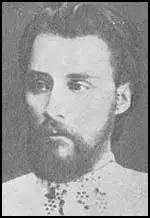Alexander Kviatkovsky

Alexander Kviatkovsky, the son of a aristocrat was born in 1853. He joined the Land and Liberty group and in 1876 was arrested. In October, 1879, the Land and Liberty split into two factions. The majority of members, who favoured a policy of terrorism, established the People's Will (Narodnaya Volya). Others, such as George Plekhanov formed Black Repartition, a group that rejected terrorism and supported a socialist propaganda campaign among workers and peasants. Elizabeth Kovalskaia was one of those who rejected the ideas of the People's Will: "Firmly convinced that only the people themselves could carry out a socialist revolution and that terror directed at the centre of the state (such as the People's Will advocated) would bring - at best - only a wishy-washy constitution which would in turn strengthen the Russian bourgeoisie, I joined Black Repartition, which had retained the old Land and Liberty program."
Kviatkovsky, Vera Figner, Anna Korba, Andrei Zhelyabov, Timofei Mikhailov, Lev Tikhomirov, Mikhail Frolenko, Grigory Isaev, Sophia Perovskaya, Nikolai Sablin, Ignatei Grinevitski, Nikolai Kibalchich, Nikolai Rysakov, Gesia Gelfman, Anna Yakimova and Tatiana Lebedeva joined the People's Will. Figner later recalled: "We divided up the printing plant and the funds - which were in fact mostly in the form of mere promises and hopes... And as our primary aim was to substitute the will of the people for the will of one individual, we chose the name Narodnaya Volya for the new Party."
Soon afterwards the People's Will decided to assassinate Tsar Alexander II. According to the historian, Joel Carmichael: "Although this populist organization retained the same humane vocabulary - revolving around socialism, faith in the people, the overthrow of the autocracy, and democratic representation - its sole objective was, in fact, the murder of the tsar. The preparation for this demanded boundless zeal, painstaking diligence, and great personal daring. In fact, the idealism of these young assassins was perhaps the most impressive thing about the whole populist movement. Though a few populist leaders were of peasant origin, most were drawn from the intelligentsia of the upper and middle classes. The motives of the latter were quite impersonal ; one of the things that baffled the police in stamping out the movement - in which they never succeeded - was just this combination of zeal and selflessness. The actual membership of the populist societies was relatively small. But their ideas attracted wide support, even in the topmost circles of the bureaucracy and, for that matter, in the security police as well. The upper-class origins of many of the revolutionaries meant a source of funds; many idealists donated their entire fortunes to the movement."
It was discovered that every Sunday the Tsar took a drive along Malaya Sadovaya Street. It was decided that this was a suitable place to attack. Yakimova was given the task of renting a flat in the street. Gesia Gelfman had a flat on Telezhnaya Street and this became the headquarters of the assassins whereas the home of Vera Figner was used as an explosives workshop.
The Okhrana discovered that their was a plot to kill Alexander II. One of their leaders, Andrei Zhelyabov, was arrested on 28th February, 1881, but refused to provide any information on the conspiracy. He confidently told the police that nothing they could do would save the life of the Tsar. Alexander Kviatkovsky was arrested soon afterwards.
Alexander Kviatkovsky died in prison in 1884.
Primary Sources
(1) Joel Carmichael, A Short History of the Russian Revolution (1976)
The terrorism that supplemented or replaced the populists' folk-worshipping idealism naturally took the form of an attempt on the tsar's life. One of the principal currents of populism was ultimately successful in this, assassinating the same tsar, Alexander II, who had emancipated the serfs. Although this populist organization retained the same humane vocabulary - revolving around socialism, faith in the people, the overthrow of the autocracy, and democratic representation - its sole objective was, in fact, the murder of the tsar. The preparation for this demanded boundless zeal, painstaking diligence, and great personal daring. In fact, the idealism of these young assassins was perhaps the most impressive thing about the whole populist movement. Though a few populist leaders were of peasant origin, most were drawn from the intelligentsia of the upper and middle classes. The motives of the latter were quite impersonal ; one of the things that baffled the police in stamping out the movement - in which they never succeeded - was just this combination of zeal and selflessness.
The actual membership of the populist societies was relatively small. But their ideas attracted wide support, even in the topmost circles of the bureaucracy and, for that matter, in the security police as well. The upper-class origins of many of the revolutionaries meant a source of funds; many idealists donated their entire fortunes to the movement. It must be remembered that the Russian upper classes or many of their individual members were in a peculiarly contradictory situation ; they had been brought up, after all, on the humanitarian ideals common to European civilization, yet they were living in conditions that were more blatantly at variance with European ideals than those of any other country. They had to make a choice: either give lip service to the conventional ideals or take to the high road of action to force society to conform with its own ideals. Even the Bolsheviks were later to benefit by this singular situation; many capitalists assuaged their consciences by contributing funds for their activities.
